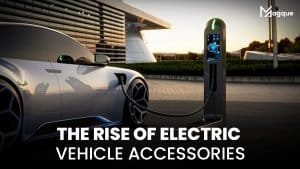Outline
H1: Introduction
- Brief overview of the electric car market in 2023
- Growing interest in sustainable and eco-friendly transportation
H2: Advancements in Electric Vehicle Technology
- Breakthroughs in battery technology
- Enhanced charging infrastructure
- Integration of artificial intelligence in electric vehicles
H3: Top 5 Electric Cars for 2023
- In-depth review of the leading electric car models
- Tesla Model Y: Revolutionizing electric SUVs
- Nissan Leaf: A reliable and affordable choice
- Audi e-Tron: Luxury meets sustainability
- Chevrolet Bolt EUV: Long-range capabilities
- Ford Mustang Mach-E: Blending performance with eco-friendliness
H4: Environmental Impact and Benefits
- Carbon footprint reduction
- Government incentives for electric car owners
- Positive effects on air quality and public health
H3: Charging Infrastructure Expansion
- Global efforts to improve charging networks
- Fast-charging stations and their accessibility
H4: Overcoming Range Anxiety
- Advancements in electric car range
- Real-world examples of long-distance electric journeys
H2: Electric Cars in Everyday Life
- Practicality for daily commuting
- Cost savings compared to traditional vehicles
- User experiences and testimonials
H3: Maintenance and Cost Considerations
- Lower maintenance costs of electric vehicles
- Long-term financial benefits for owners
H4: Addressing Common Myths
- Dispelling misconceptions about electric cars
- Addressing concerns about battery life and replacement costs
H1: Conclusion
- Summarizing the key points discussed in the article
Introduction
As we enter 2023, the electric car market is experiencing unprecedented growth, fueled by a global commitment to sustainable and eco-friendly transportation. In this comprehensive guide, we’ll explore the latest advancements in electric vehicle technology, review the top electric car models for 2023, and delve into the environmental impact and benefits of making the switch to electric.
Advancements in Electric Vehicle Technology
Electric vehicle technology is evolving remarkably, with significant breakthroughs in battery technology, charging infrastructure, and the integration of artificial intelligence. The improvements in battery efficiency are extending the range of electric cars, making them more practical for a broader range of consumers. Additionally, expanding charging infrastructure globally addresses one of the major concerns of potential electric car owners – range anxiety.
Top 5 Electric Cars for 2023
Let’s look at the leading electric car models shaping the automotive landscape in 2023.
Tesla Model Y: Revolutionizing electric SUVs
Tesla continues to lead the way in electric vehicle innovation, and the Model Y is no exception. The Model Y redefines the electric SUV market by combining performance, style, and cutting-edge technology.
Nissan Leaf: A reliable and affordable choice
Known for its reliability and affordability, the Nissan Leaf remains a popular choice for those looking to switch to electric without breaking the bank.
Audi e-Tron: Luxury meets sustainability
Audi’s e-Tron series brings luxury to the electric vehicle market, proving that sustainability and style coexist seamlessly.
Chevrolet Bolt EUV: Long-range capabilities
With an impressive range and practical design, the Chevrolet Bolt EUV is a strong contender for those seeking an electric car with long-distance capabilities.
Ford Mustang Mach-E: Blending performance with eco-friendliness
The Ford Mustang Mach-E combines the iconic Mustang performance with eco-friendly features, offering an exhilarating driving experience without compromising sustainability.
Environmental Impact and Benefits
Transitioning to electric cars goes beyond personal convenience; it contributes to a significant reduction in carbon footprint. Governments worldwide are incentivizing electric car adoption, benefitting owners and positively impacting air quality and public health.
Charging Infrastructure Expansion
Global efforts to improve charging networks make electric vehicles more practical and accessible. Fast-charging stations are becoming increasingly prevalent, addressing concerns about the time required for charging.
Overcoming Range Anxiety
The electric car range advancements have made long-distance journeys possible and increasingly convenient. Real-world examples of electric car owners embarking on cross-country trips showcase the evolving capabilities of electric vehicles.
Electric Cars in Everyday Life
Electric cars are no longer futuristic but a practical choice for daily commuting. Beyond environmental benefits, owners experience significant cost savings compared to traditional vehicles. User testimonials highlight the seamless integration of electric cars into everyday life.
Maintenance and Cost Considerations
Lower maintenance costs associated with electric vehicles contribute to their long-term financial benefits for owners. The simplicity of electric motors compared to traditional combustion engines results in fewer moving parts and reduced maintenance requirements.
Addressing Common Myths
Dispelling misconceptions about electric cars is crucial for broader adoption. This section addresses common myths, including concerns about battery life, replacement costs, and overall performance.
Conclusion
In conclusion, the electric car landscape in 2023 is vibrant and promising. Advancements in technology, coupled with an expanding range of models, make electric vehicles a compelling choice for consumers. The environmental benefits associated with financial incentives and a growing charging infrastructure position electric cars as a pivotal player in the future of transportation. Read More :- https://magque.com/
FAQs
1. Are Electric Cars More Expensive than Traditional Vehicles?
-
- Contrary to popular belief, many electric cars are now competitively priced, and long-term savings on fuel and maintenance often outweigh the initial cost.
2. What is Range Anxiety, and How do Electric Cars Address it?
-
- Range anxiety is the fear of running out of battery power before reaching a charging station. Advances in battery technology and an expanding charging network are mitigating this concern.
3. Do Electric Cars Require a Lot of Maintenance?
-
- Electric cars generally have lower maintenance costs due to the simplicity of electric motors compared to traditional combustion engines.
4. How Long Does It Take to Charge an Electric Vehicle?
-
- Charging times vary, but with fast-charging stations, it’s possible to get a significant charge quickly, making long journeys more feasible.
5. Are there Government Incentives for Electric Car Owners?
-
- Yes, many governments offer incentives such as tax credits, rebates, and reduced registration fees to encourage the adoption of electric vehicles.
Get Access Now: https://bit.ly/J_Umma “The Future Of Car Audio: Trends In Vehicle Sound Systems“













